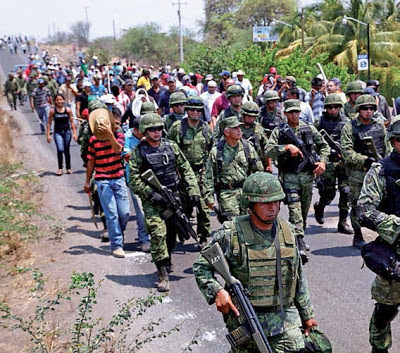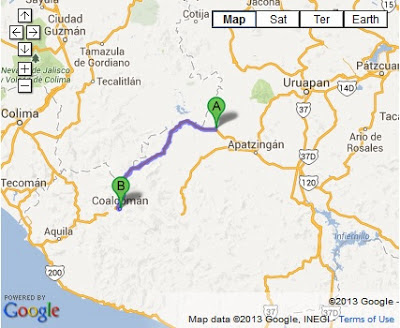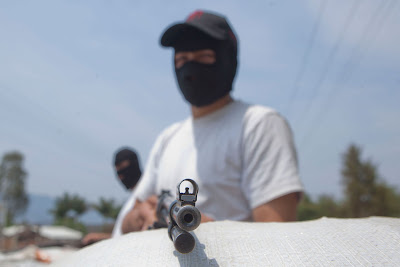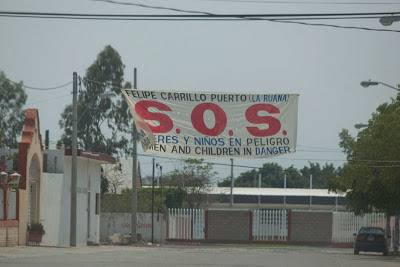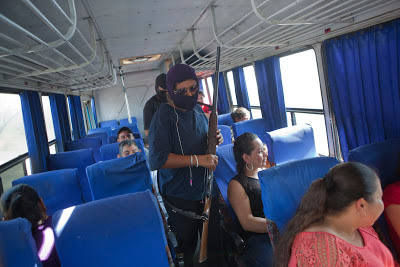By: José Gil Olmos
May 26 2013
Coalcomán, Michoacán
The mayor’s words strongly thundered like rockets on Sunday, May 19 setting the public on alert when the military arrived to try to disarm the people:
“The situation was unbearable! We were all being extorted. Even in the municipality we had to give them 10% of the budget each month and they were already starting to ask for 15%. This happens with all the municipalities in the state and the governor even knows about it. We accepted it at first, but when we stopped was when they started to mess with our families; they raped and took our wives, our daughters. That’s when we said—Enough! This is a matter of dignity.”
 |
Self-defense Group in Buenavista, Michoacán Photo: Octavio Gómez |
It’s Tuesday morning on May 21st. Outside the town hall is a group of armed soldiers. They arrived in armored vehicles parking on the corners of the main square as if it were a war zone.
“Yes, we are like in a war,” says the mayor Rafael García Zamora of the PRD. He reveals in an interview that the entire population and the authorities were subjected to the Knights Templar cartel (Los Caballeros Templarios), whom they have received death threats for some time.
In the more than 200 kilometers between Apatzingán and this municipality of the Tierra Caliente region, there are traces of a buried battle. In short sections of the road, four military checkpoints were initially installed, later increasing to six. In each one, soldiers check every vehicle, writing down license plates and the names of the people inside.
Meanwhile, self defense groups also installed at least 4 checkpoints throughout several days, starting from Buenavista Tomatlán down to Coalcomán, where they check people who look suspicious and detain collaborators of the Knights Templar cartel. Up until a few days ago, this group was the one in charge of installing checkpoints.
Traces from the clashes between self defense groups and gunmen are all too evident. Passing Apatzingán, in some houses of Pueblo Viejo, bullet holes from high powered weapons can be seen as a result of a firefight that happened a few weeks ago, with several deaths, of which was not officially reported.
 |
Michoacán. State at War. Photo: Octavio Gómez |
On the same road that connects Tepalcatepec with Coalcomán, charred remains of passenger, cargo, and trailer trucks can be seen burnt by cartel members, who in recent days blocked the roads of these two municipalities and also Buena Vista Tomatlán in order to besiege them.
For several weeks, the criminal gang denied trucks from entering the city that among other supplies, bring gasoline, food, and antidotes for scorpion bites, badly needed in the three municipalities.
Even Coca-Cola and Bimbo have decided to suspend their runs. To avoid the virtual state of siege, some traders have sought to stock up on food and fuel by the roads that go to Jalisco and Colima.
Given the seriousness of this situation, on Sunday May 20th, more than 6,000 soldiers and hundreds of police on trucks arrived to the Tierra Caliente region.
The order was to calm the area, but the first thing that they did was try to disarm the self defense groups that organized themselves to fend off attacks from the Knights Templar cartel.
The people responded with mass marches in the three municipalities, which has never been done before in the past, refused to turn in their weapons and kept the military from being placed in charge of the checkpoints. “If we turn in our weapons the gunmen will kill us,” said a member of the Civic Association of Tepalcatepec, which has more than 1,000 men participating in the surveillance of Tepalcatepec.
 |
Self-defense Group in Buenavista, Michoacán Photo: Octavio Gómez |
Over the days the situation has become tenser because the federal forces have become dedicated in disarming the self defense groups and not fighting the Knights Templar cartel. Until Friday May 24th, there hasn’t been a single criminal arrested.
On Wednesday May 22, there was a skirmish between soldiers and residents of Buenavista Tomatlán which lasted all day because soldiers arrested four young members of the self defense group.
Men, women, and children left their homes and closed the road demanding the release of their four companions in exchange for General Sergio Arturo García Aragón and 24 soldiers who had been locked up in the headquarters of the municipal police.
Another group of armed soldiers and police surrounded the locals. Planes and helicopters flew over the municipality. Presented in a meeting, García Aragón explained that the four members who were arrested weren’t in the hands of the military, but rather had been referred to the judicial authorities and would be released. But he warned: “I told them not to be armed”.
The soldiers, who were not abused, were held for 17 hours in the headquarters of the municipal police. On Wednesday (May 22) at nine in the night, they reached an agreement and the four community police members were released and they immediately opened the doors for the soldiers who were being held along with García Aragón.
 |
| Jesús Reyna left, Miguel Ángel Osorio Chong right |
While the Interior Minister, Miguel Ángel Osorio Chong, and Michoacan Governor Jesús Reyna separately declared that the detention and exchange of detainees by the military never happened, the people of Buenavista Tomatlán confirm these facts. They also say that while they were resolving the problem with the military, on the other side of town, a gunfight broke out with gunmen who were trying to get into the town in three trucks.
 |
Community Guard in Coalcoman, Michoacán Photo: Octavio Gómez |
In the version of the witnesses, the four community police members complained that the military soldiers did in fact torture them; the soldiers put high powered weapons in their hands and took pictures of the community police members holding them. They also forced them to sign a statement that wasn’t theirs.
The agreement that they reached with General García Aragón was that the self defense groups would put away their high-powered weapons and leave the checkpoints, but that some community police officers would accompany the soldiers at the checkpoints to not let them pass any Knights Templar cartel members who live in those communities.
This is what actually happened; the self-defense groups of Buenavista Tomatlán, Tepalcatepec and Coalcomán left their checkpoints, kept their R-15’s and AK-47’s without turning them in to the military, as these were demanded, and withdrew back into their communities. They did not disappear, but instead joined similar groups that have appeared throughout the state.
Confidential reports from the state government say that 25 communities in 11 municipalities, especially in the Purépecha plateau have community police. They coexist in Michoacán with 10 self-defense groups and 10 paramilitary groups paid for by organized crime.
 |
| Buenavista, Michoacán. War Zone. Photo: Octavio Gómez |
According to the same source, these three types of armed groups have a presence in 44 of the 113 municipalities of the state, and another 10 have been on red alert for possibly forming new groups.
The insecurity in the state has grown so much that in the capital of Michoacán, Morelia, citizens have closed more than 1,200 streets and have organized into self-defense groups. They have put up mantas in the colonies warning that they are fed up with how things are going and will take security into their own hands.
Similar initiatives are underway by citizens of 10 other cities including Uruapan, Hidalgo, Zamora, Lázaro Cárdenas, Sahuayo, Jiquilpan and Jacona. According to reports from the state government, the Knights Templar cartel controls 70% of the municipalities, and the rest remains under control by La Familia Michoacana cartel and the Jalisco New Generation cartel (CJNG).
Extortions and Rapes
 |
Tepalcatepec, Michoacán Messages to “La Tuta” "You Sold Us 'At a High Price'" "To The Templars-Go Away!" Photo: Octavio Gómez |
Residents of Tierra Caliente recount that a couple of years ago gunmen from the Knights Templar cartel came to promise them that they would look after them after suffering for 12 years of insecurity in the region; in return they would ask for a fee. Most people agreed, not knowing that soon their belongings would be stolen, and their families would end up being victims of violence.
Residents of Buenavista Tomatlán, Coalcomán and Tepalcatepec indicate that this year the gunmen began to demand higher fees, and all over, to merchants, ranchers, farmers, transporters, small business owners, and even the municipality: 300 pesos per square meter of a house, 200 per car, 20 per kilo of tortillas, 8 per kilo of meat, 3 per kilo of live cows sold, and 3 per box of lemon.
Similarly, day laborers had to give 200 pesos a week and mayors needed to turn in 10% of the budget and work assigned. The latter were already on the verge of being charged 15%, i.e. more than 20 million pesos per month. “We would comply as if we were their slaves. The worst thing is that they would mess with our women, with our wives and daughters,” said a trader from Tepalcapatec.
Rafael García Zamora, from Coalcomán, did not leave his job. Luis Torres Chávez from Buenavista Tomatlán and Guillermo Valencia from Tepalcatepec resigned when the population rebelled against the insecurity and the extortions.
García Zamora denies that the self-defense movement is supported by the Jalisco New Generation cartel, as mentioned before in the state government, and states that it is an expression of weariness: “We had a march of 8,000 people. If this is the Jalisco New Generation cartel then things are wrong. This protest was for high extortion, so many threats, intimidation, abductions, kidnappings, and quotas. The people could no longer stand this.”
An owner of a logging company who also had to pay a quota to the Knights Templar cartel realizes the power that this cartel had achieved:
“You initially pay 10% of “El Ramo 33” and construction commitments. This is happening in the 113 municipalities and no one dares to denounce it. I’m doing this and I know that I’m in more danger. We have to alter the work in that 10% and pay them to avoid any problems. They were going to increase it to 15% but we wouldn’t be able to pay that. We informed the federation about this, they know it, but nobody does anything.”
“We were being extorted, intimidated, threatened, around here—signaling to the main square of the municipality—Armed groups passed through here mixed with the army and state police. We didn’t know who was who. Now we have clearly identified everyone because only the community police are operating.”
“We were paying the quotas and everything would’ve stayed that way, but they started to mess with our families, with the women, they were forced to have sex with them; if they were to refuse, they would kill their parents. They even forced the married women. Yet no one dares to report them, it’s bad. That is why people said enough is enough, this is about dignity.”
-“Then is it true that those who couldn’t pay the quota were forced to give them their daughters or wives?”
-“Yes, that was the problem. The government is aware of this situation but does nothing because everyone’s in on it: the deputies, senators and maybe even the President, all this is a cancer that can’t be stopped.”
Violence has weakened businesses. Juan Pablo Castañón, national representative of Coparmex (Employers Confederation of the Mexican Republic) recently stated that there was a 15% decline in the economic dynamics of Michoacán, especially in the most affected areas.
The president of the College of Economists of the State of Michoacán, Heliodoro Gil Corona, stated in a press conference a week ago that in the first quarter of 2013, 3,424 jobs have been lost in the state of Michoacán.
Gil Corona, a researcher at the Universidad Michoacana de San Nicolás de Hidalgo, considered that if you wanted to break this growth trend of unemployment and lack of jobs, you would need the economy to grow by 3% this year and an investment of 24 billion pesos.
Following the retirement of the Governor Fausto Vallejo due to health reasons and view of the situation in Tierra Caliente, a group of PAN legislators, led by María Luisa Calderón and Salvador Vega Casillas requested the Congress of the Union to declare the demise of powers in the state, claiming a crisis of governability.
From: Proceso 1908; Pages 6-10
